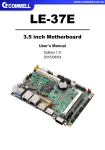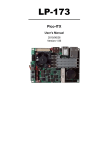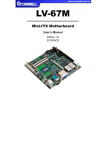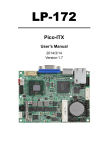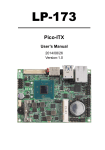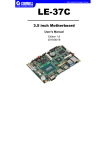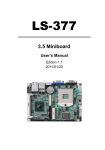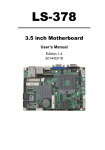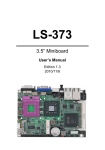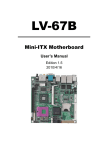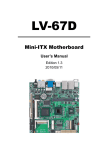Download User`s manual
Transcript
LP-174 Pico-ITX Motherboard User’s Manual Edition 1.1 2015/08/05 LP-174 User’s Manual Copyright Copyright 2015, all rights reserved. This document is copyrighted and all rights are reserved. The information in this document is subject to change without prior notice to make improvements to the products. This document contains proprietary information and protected by copyright. No part of this document may be reproduced, copied, or translated in any form or any means without prior written permission of the manufacturer. All trademarks and/or registered trademarks contains in this document are property of their respective owners. Disclaimer The company shall not be liable for any incidental or consequential damages resulting from the performance or use of this product. The company does not issue a warranty of any kind, express or implied, including without limitation implied warranties of merchantability or fitness for a particular purpose. The company has the right to revise the manual or include changes in the specifications of the product described within it at any time without notice and without obligation to notify any person of such revision or changes. Trademark All trademarks are the property of their respective holders. Any questions please visit our website at http://www.commell.com.tw TU UT -1- LP-174 User’s Manual Packing List: Please check the package content before you starting using the board. 1 x LP-174 Pico-ITX Motherboard (include Cooler Fan) 1 x SATA & SATA Power Cable (OALSATA22B-PM15SH15 / 1040512) 1 x PS/2 Keyboard & Mouse cable (OALPS2/KM / 1040131) 1 xDC Input Power Cable (OALDC-B / 1040513) 1 x Audio cable (OALPJ-HDUNB / 1040123) 1 xUSB2.0 Cable (OALUSBA-3 / 1040173) 1 x Onboard DVI-D cable (BADPDVI_A & OALDVI-DF13 / 4120008011 & 1040483) 1 x Dual COM Cable (OALES-BKU2-H14NB / 1040379) -2- LP-174 User’s Manual Index Chapter 1 <Introduction>............................................................... 4 1.1 <Product Overview> ................................................................................. 4 1.2 <Product Specification> ...................................................................................5 1.3 <Mechanical Drawing> .....................................................................................6 1.4 <Block Diagram> ...............................................................................................7 Chapter 2 <Hardware setup>......................................................... 8 2.1 <Connector Location and Reference> ...........................................................8 2.1.1 <Internal connectors list> ............................................................. 9 2.1.2 <External connectors list> ............................................................ 9 2.2 <Jumper Location and Reference> ..............................................................10 2.2.1 <Jumper list> .............................................................................. 10 2.2.2 <Clear CMOS and Power on type selection> ............................ 10 2.3 <Installing the Memory> ................................................................................. 11 2.4 <I/O interface> .................................................................................................12 2.4.1 <Serial ATA interface> ................................................................ 12 2.4.2 <Ethernet interface> ................................................................... 12 2.4.3 <Display interface> ..................................................................... 13 2.4.4 <Serial Port interface> ................................................................ 15 2.4.5 <USB interface> ......................................................................... 16 2.4.6 <Audio interface> ....................................................................... 16 2.4.7 <Expansion slot> ........................................................................ 17 2.4.8 <Front panel switch and indicator> ............................................ 17 2.4.9 <Other interface> ........................................................................ 18 2.5 <Power supply> ...............................................................................................19 2.5.1 <Power input> ............................................................................ 19 2.5.2 <Power output> .......................................................................... 19 Appendix A <Flash BIOS> ........................................................... 20 Appendix B <Installation driver Notes> ..................................... 21 Appendix C <LCD Panel Type select> ........................................ 22 Appendix D <Programmable Watch Dog Timer> ....................... 23 Contact information ..................................................................... 24 -3- LP-174 User’s Manual Chapter 1 <Introduction> 1.1 <Product Overview> th th LV-174 is Pico-ITX Motherboard which supports 5 /4 Generation Intel® Core™ U-series i7, i5, i3, Celeron Mobile Processor with Wildcat Point PCH-LP, integrated HD Graphics, DDR3L memory, Realtek High Definition Audio, Intel Gigabit LAN, Serial ATA3 with AHCI function for a system. Intel Broadwell-U Processor with Wildcat Point PCH-LP The 5 th Generation Intel® Core™ U-series processor family is the next generation and compatible with Haswell-U, multi-core mobile processor built on 14/22 nanometer process with MCP technology. The Broadwell-U has a lower TDP 15W and 28W, it provides new HD Graphics (GT2 and GT3 GPU) support triple display at the same time, maximum supported is up to 16GB of DDR3L, better performance, flexibility and more enhanced security that is suitable for a variety of intelligent systems the ideal choice. All in One multimedia solution The board provides high performance onboard graphics, 24-bit dual channel LVDS interface, DisplayPort, DVI-D, and High Definition Audio, to meet the very requirement of the multimedia application. Flexible Expansion Interface The board provides one MiniPCIe and support mSATA. -4- LP-174 User’s Manual 1.2 <Product Specification> System Processor Chipset Memory Watchdog Timer Real Time Clock Expansion Intel® Broadwell/Haswell Core™ i7, i5, i3, Celeron U-series Processor FCBGA1168 with MCP Wildcat Point-LP 1 x DDR3L SO-DIMM 1333/1600 MHz up to 8GB Support Non-ECC, unbuffered memory only Generates a system reset with internal timer for 1min/s ~ 255min/s Chipset integrated RTC with onboard lithium battery 1 x MiniPCIe (support mSATA) Graphics Chipset Display Interface Intel® 5th/4th Gen integrated HD Graphics 1 x DVI-D, 1 x DisplayPort, 1 x LVDS LAN Chip 1 x Intel® I218-LM Gigabit LAN (Support iAMT10.0) I/O Serial ATA Audio Internal I/O Rear I/O 1 x SATA3 Realtek ALC888 HD Audio 1 x SATA3, 2 x RS232, 2 x USB2.0, 1 x LVDS, 1 x LCD inverter, 1 x LPC, 1 x SMBUS, 1 x Audio, 1 x DC Out, 1 x PS/2, 1 x DVI-D 1 x DisplayPort, 2 x USB3.0, 1 x LAN Mechanical & Environmental Power Requirement Size & Thickness Temperature Relative Humidity DC 9~24V or 12V (optional) 100mm x 72mm (L x W), 1.6mm Operating within 0°C~60°C (32°F~140°F) Storage within -20°C~80°C (-4°F~176°F) 10%~90%, non-condensing -5- LP-174 User’s Manual 1.3 <Mechanical Drawing> -6- LP-174 User’s Manual 1.4 <Block Diagram> eDP PTN3460 Channel A CPU 1 x LVDS DDI 1 x DisplayPort th 5 /4 DDR3L SO-DIMM PCIe x1 I218-LM th PCIe x1 Gen Processor DDI SATA3 SATA3 SPI 1 x DVI-D 1 x SATA3 MiniPCIe / mSATA SPI Flash USB3.0 2 x USB3.0 PCH-LP USB2.0 SMBus 1 x SMBUS HDA 2 x USB2.0 ALC888 HD Audio 1 x LPC 2 x RS232 LPC SIO 1 x PS/2 NCT6102D -7- LP-174 User’s Manual Chapter 2 <Hardware setup> 2.1 <Connector Location and Reference> DisplayPort USB LAN CN_LVDS DC_IN CN_LPC CN_DVI CN_USB MINI_CARD CN_PS2 JFRNT CN_AUDIO CN_SMBUS CPUFAN SO-DIMM DC_OUT SYSFAN CN_INV CN_COM1/2 CN_SATA -8- LP-174 User’s Manual 2.1.1 <Internal connectors list> Connector Function SO-DIMM 204-pin DDR3L SO-DIMM slot CN_SATA 10-pin Serial ATA3 connector CN_AUDIO 5 x 2-pin audio pin header CN_LPC 6 x 2-pin LPC pin header CN_LVDS 20 x 2-pin LVDS connector CN_INV 5-pin LCD inverter connector CN_SMBUS 5-pin SMBus connector CN_COM1/2 20-pin RS232 connector CN_USB 5 x 2-pin USB2.0 pin header CN_DVI 10 x 2-pin DVI connector CN_PS2 5 x 2-pin PS/2 pin header CPUFAN 3-pin CPU fan connector SYSFAN 3-pin system fan connector JFRNT 5 x 2-pin front panel switch/indicator pin header MINI_CARD 52-pin MiniPCIe card slot DC_OUT 6-pin SATA Power connector DC_IN 2-pin power input Terminal Block 2.1.2 <External connectors list> Connector Function DisplayPort DisplayPort connector USB 2 x USB3.0 connector LAN RJ45 connector -9- LP-174 User’s Manual 2.2 <Jumper Location and Reference> JVLCD JRTC 1 3 JMSATA 1 3 JAT 2.2.1 <Jumper list> Jumper Function JAT Power mode select JRTC CMOS Normal/Clear Setting JVLCD Panel Voltage Setting JMSATA MiniCard mSATA Setting 2.2.2 <Clear CMOS and Power on type selection> JRTC: Clear CMOS data jumper Jumper settings 1-2 2-3 Function Clear CMOS Normal (Default) JAT: AT/ATX mode select jumper Jumper settings 1-2 2-3 Function AT mode ATX mode (Default) -10- LP-174 User’s Manual 2.3 <Installing the Memory> In the process, the board must be powered off. 1. Put the memory tilt into the slot. Note the Memory notch key aligned slot key. 2. Then press down till lock into the mounting notch. Key Press down Mounting notch 3. To remove the memory, push outward on both sides of the latch. Latch -11- LP-174 User’s Manual 2.4 <I/O interface> 2.4.1 <Serial ATA interface> CN_SATA: SATA3 10-pin connector Pin 1 2 3 4 5 6 7 8 9 10 Signal GND TX+ TXGND NC NC GND RXRX+ GND CN_SATA 1 10 2.4.2 <Ethernet interface> The board provide I218-LM Gigabit Ethernet which supports WOL on rear I/O. It supports Intel® AMT 10.0 feature. (Note that the CPU must support vPro technology, ex: i7-5650U) I218-LM -12- LP-174 User’s Manual 2.4.3 <Display interface> Based on the 5th/4th Gen CPU with built-in HD Graphics, the DisplayPort up to 3840x2160 @ 60Hz on rear I/O. About the internal Display, the DVI-D resolution up to 1920x1200 @ 60Hz and LVDS (PTN3460) up to 1920x1200 @ 60Hz support 18/24-bit color depth and dual channel. About select LCD Panel Type in BIOS, please refer Appendix C. The built-in HD Graphics support triple display function with clone mode and extended mode. DisplayPort CN_LVDS 1 39 2 40 CN_DVI JVLCD 1 3 CN_INV 1 5 -13- 2 1 20 19 LP-174 User’s Manual CN_DVI: DVI 20-pin connector Pin 1 3 5 7 9 11 13 15 17 19 Signal 5V HPD TMDS_TX0GND TMDS_TX1+ TMDS_TX2GND TMDS_CLK+ SDA NC Pin 2 4 6 8 10 12 14 16 18 20 Signal NC GND TMDS_TX0+ TMDS_TX1GND TMDS_TX2+ TMDS_CLKGND SCL NC CN_LVDS: LVDS 40-pin connector (Model: HIROSE DF13-40DP-1.25V compatible) Pin 2 4 6 8 10 12 14 16 18 20 22 24 26 28 30 32 34 36 38 40 Signal Set by JVLCD Detect (Active low) A_LVDS_0A_LVDS_0+ GND A_LVDS_1A_LVDS_1+ GND A_LVDS_2A_LVDS_2+ GND A_LVDS_CLKA_LVDS_CLK+ GND A_LVDS_3A_LVDS_3+ GND LVDS_DDCSCL LVDS_DDCSDA NC Pin 1 3 5 7 9 11 13 15 17 19 21 23 25 27 29 31 33 35 37 39 Note: Pin4 only need to be connected to GND -14- Signal Set by JVLCD GND B_LVDS_0B_LVDS_0+ GND B_LVDS_1B_LVDS_1+ GND B_LVDS_2B_LVDS_2+ GND B_LVDS_3B_LVDS_3+ GND B_LVDS_CLKB_LVDS_CLK+ GND NC NC NC LP-174 User’s Manual CN_INV: LVDS 5-pin Backlight power connector Pin 1 2 3 4 5 Signal 12V Backlight Control 5V GND Enable Backlight JVLCD: LVDS panel power select jumper Jumper settings 1-2 2-3 Function 3.3V (Default) 5V 2.4.4 <Serial Port interface> CN_COM1/2 1 20 CN_COM1/2: RS232 20-pin connector Pin 1 3 5 7 9 11 13 15 17 19 Signal DCD1 TXD1 GND RTS1 RI1 DCD2 TXD2 GND RTS2 RI2 Pin 2 4 6 8 10 12 14 16 18 20 -15- Signal RXD1 DTR1 DSR1 CTS1 NC RXD2 DTR2 DSR2 CTS2 Key LP-174 User’s Manual 2.4.5 <USB interface> USB3.0 CN_USB 1 2 9 10 CN_USB: Front panel USB2.0 10-pin header (Pitch 2.54mm) Pin 1 3 5 7 9 Signal 5VSB DATA0DATA0+ GND GND Pin 2 4 6 8 10 Signal 5VSB DATA1DATA1+ GND Key 2.4.6 <Audio interface> CN_AUDIO 2 10 1 9 CN_AUDIO: Front panel audio 10-pin header (Pitch 1.27mm x 2.54mm) Pin 1 3 5 7 9 Signal MIC_L MIC_R FP_OUT_R SENSE FP_OUT_L Pin 2 4 6 8 10 -16- Signal GND NC MIC_DETECT Key FP_OUT_DETECT LP-174 User’s Manual 2.4.7 <Expansion slot> 1 JMSATA 3 MINI_CARD MINI_CARD have some special design to compatible our MiniPCIe card (ex: MPX-574D2, MPX-210D2 etc) and support mSATA set by JMSATA JMSATA: Setting MINI_CARD to support PCIe/mSATA Jumper settings 1-2 2-3 Function Support mSATA Normal operation (Default) 2.4.8 <Front panel switch and indicator> JFRNT 2 10 1 9 JFRNT: Front panel switch and indicator 14-pin header (Pitch 2.54mm) Pin 1 3 5 7 9 Signal Power_ONSpeakerHDD_LEDPower_LEDReset+ Pin 2 4 6 8 10 -17- Signal Power_ON+ Speaker+ HDD_LED+ Power_LED+ Reset- LP-174 User’s Manual 2.4.9 <Other interface> CN_LPC 12 11 2 1 CN_LPC: LPC 12-pin header (Pitch 2.00mm) Pin 1 3 5 7 9 11 Signal CLK -LFRAME LAD2 LAD0 SERIRQ 3.3VSB Pin 2 4 6 8 10 12 Signal RST LAD3 LAD1 3.3V GND NC CN_LPC support TPM module. CN_SMBUS CN_SMBUS: SMBus 5-pin connector Pin 1 2 3 4 5 1 Signal 5V NC SMBDAT SMBCLK GND 5 CPUFAN: CPU cooler fan 3-pin connector Pin Signal 1 GND 2 12V 3 Sensor CPUFAN SYSFAN: System cooler fan 3-pin connector Pin Signal 1 GND 2 12V 3 Sensor -18- SYSFAN 3 3 1 1 LP-174 User’s Manual 2.5 <Power supply> 2.5.1 <Power input> DC_IN 2 1 The power support 9~24V wide voltage input. DC_IN: Terminal Block 2-pin power connector Pin 1 Signal GND Pin 2 2.5.2 <Power output> DC_OUT: SATA power 6-pin connector Pin 1 2 3 4 5 6 Signal 12V 12V GND GND 5V 5V DC_OUT 1 6 -19- Signal Power in LP-174 User’s Manual Appendix A <Flash BIOS> A.1 <Flash tool> The board is based on Phoenix BIOS and can be updated easily by the BIOS auto flash tool. You can download the tool online at the address below: http://www.commell.com.tw/Download/BIOS/FPT10.rar The tool’s file name is “fpt.exe”, it’s the utility that can write the data into the BIOS flash chip and update the BIOS. A.2 <Flash BIOS process> 1. Please make a bootable UFD which can boot into DOS enviroment. 2. Unzip the flash tool and copy it into bootable UFD. 3. Add a bin file to the same folder.. 4. Power on the system and flash the BIOS under the DOS environment. (Command: fpt –savemac –f xxx.bin) 5. Power off the system and then power on. -20- LP-174 User’s Manual Appendix B <Installation driver Notes> B.1 <iAMT(ME) driver> Before installing, it need to install Microsoft Hotfix KB2685611 first for Win7 32/64 bit. More information please refer https://www.microsoft.com/en-us/download/details.aspx?id=38423 B.2 <USB3.0 driver> Before Win7 install the USB3.0 driver or use in Win8 and Win8.1, xHCI needs to be enabled in the BIOS. Note that if enable xHCI, all USB port will unusable in Win7. So first need copy driver folder to your HDD, then enable xHCI, and use PS/2 to do install. The path is “X:\Driver\USB3.0\Intel_USB_3.0_xHC_Driver_4.0.0.27_PV” Advanced > South Bridge Configuration > SB USB Config > xHCI Mode -21- LP-174 User’s Manual Appendix C <LCD Panel Type select> According your panel, it need to select the correct resolution in the BIOS. If there is no fit your panel type, please feedback for us to make OEM modol. NO. 1 2 3 4 5 6 7 8 BIOS panel type selection form (BIOS Version:1.0) Single / Dual channel Single / Dual channel Type NO. Type 640 x 480 9 1600 x 1050 800 x 600 10 1920 x 1200 1024 x 768 11 Reserved 1280 x 1024 12 Reserved 1400 x 1050 Reduced Blanking 13 Reserved 1400 x 1050 non-Reduced Blanking 14 Reserved 1600 x 1200 15 Reserved 1200 x 768 16 Reserved -22- LP-174 User’s Manual Appendix D <Programmable Watch Dog Timer> Timeout value range 1 to 255 Minute and Second Program sample Watchdog timer setup as system reset with 5 second of timeout -o 4E 87 ;enter configuration -o 4E 87 -o 4E 07 -o 4F 08 ;select Logical Device -o 4E 30 -o 4F 01 ; activate WDTO# function -o 4E F5 -o 4F 00 ;set “00” is second mode, set “04” is minute mode -o 4E F6 -o 4F 05 ;00h: Timeout Disable ;01h: Timeout occurs after 1 minute only ;02h: Timeout occurs after 2 second/minute ;03h: Timeout occurs after 3 second/minute … ;FFh: Timeout occurs after 255 second/minute (The deviation is approx 1 second.) For further information, please refer to Nuvoton NCT6102D datasheet -23- LP-174 User’s Manual Contact information Any advice or comment about our products and service, or anything we can help you please don’t hesitate to contact with us. We will do our best to support you for your products, projects and business. Taiwan Commate computer Inc. th Address 19F., NO.94, Sec. 1, Xintai 5 Rd., Xizhi Dist., New Taipei City 22102, Taiwan. TEL +886-2-26963909 FAX +886-2-26963911 Website www.commell.com.tw E-mail [email protected] (General infomation) [email protected] (Technical Support) Commell is a brand name of Taiwan Commate computer Inc. -24-


























